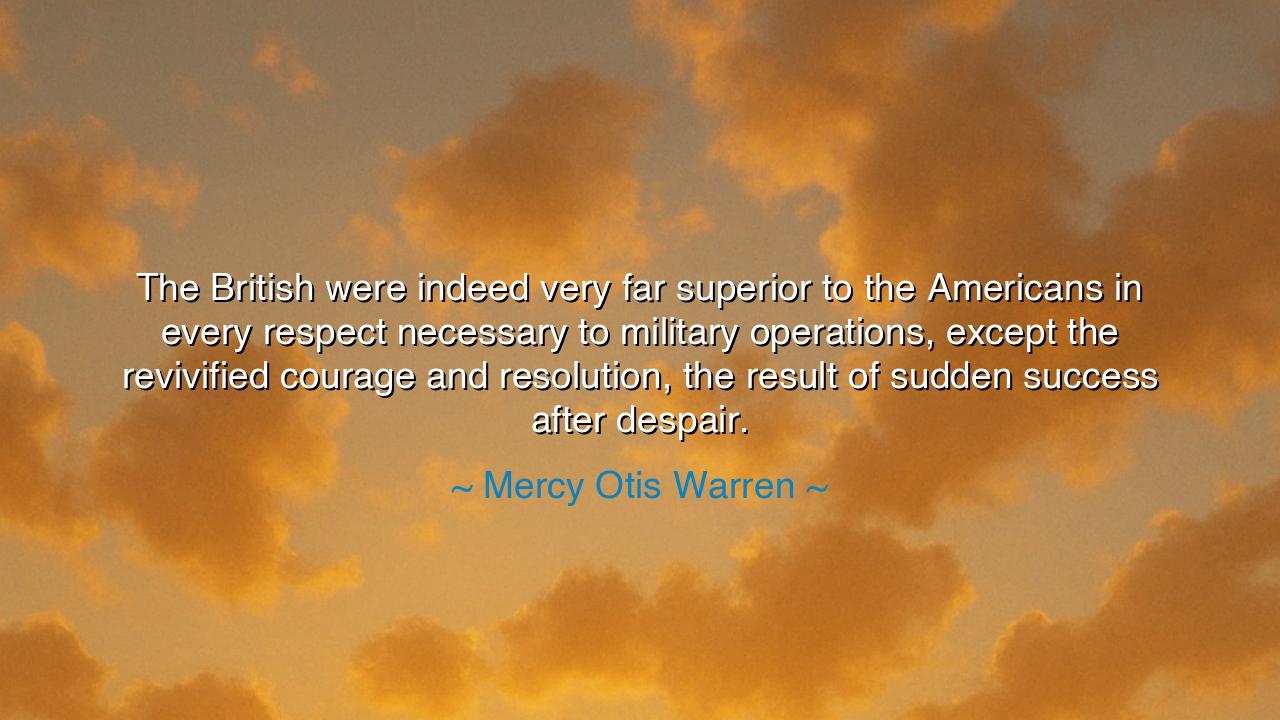
The British were indeed very far superior to the Americans in
The British were indeed very far superior to the Americans in every respect necessary to military operations, except the revivified courage and resolution, the result of sudden success after despair.






“The British were indeed very far superior to the Americans in every respect necessary to military operations, except the revivified courage and resolution, the result of sudden success after despair.” — Thus wrote Mercy Otis Warren, the patriot historian and poetess of the American Revolution, whose pen burned with the same fire that filled the hearts of those who fought for liberty. Her words, though wrapped in the language of history, hold a timeless truth about the human spirit — that the strength born of despair overcome can surpass all the advantages of power, discipline, and wealth. For nations and individuals alike, it is not perfection that wins the struggle, but revivified courage, the rebirth of resolve that rises from the ashes of defeat.
Warren, a woman of fierce intellect and revolutionary conviction, lived through the struggle she described. She saw the ragged Continental armies facing the mighty British Empire, which at the time was the most formidable power on earth — rich in ships, soldiers, and the machinery of war. The Americans were outmatched in training, equipment, and resources; their rebellion seemed, to all reason, destined for failure. And yet, in the furnace of despair — when the dream of independence seemed lost — there arose a new kind of courage, a courage reborn. It was not the confidence of strength, but the defiance of the desperate — the courage that comes only when a people refuse to die.
This is what Warren calls “revivified courage and resolution.” It is the spirit that awakens when hope itself seems extinguished. There is a strange power in despair, for when all is lost, fear itself dies — and in its place comes clarity, faith, and the fierce will to act. The Americans, driven to the edge, found within themselves a resolve that the British, secure in superiority, could not imagine. They no longer fought as soldiers for victory, but as souls for survival. And in that transformation, the tide of history began to turn.
Consider the winter of 1777 at Valley Forge — a season of hunger, disease, and near ruin. The army of Washington lay frozen, barefoot, and beaten. The cause of liberty seemed broken beneath the snow. Yet from that desolation, the American spirit was reborn. The soldiers, instead of dissolving into despair, bound themselves tighter to one another, and to their leader. Washington himself, though exhausted and burdened by the weight of a nation’s hope, refused to yield. He transformed despair into resolution, not through speeches, but through endurance. When spring came, those who had survived were no longer a band of rebels — they were an army. Their courage had been revivified by suffering, and their unity, born of shared pain, became stronger than any empire’s might.
The origin of Warren’s quote lies not only in her study of war but in her deep understanding of human nature. She knew that power and discipline, though great, cannot command the spirit of freedom. The British, for all their skill, fought to preserve dominion; the Americans, for all their weakness, fought to live as free men. It is in such contrasts that the hidden law of history reveals itself — that those who endure despair and rise again become unbreakable. The one who has nothing left to lose fights with the fire of eternity.
So too, in our own lives, Warren’s words ring true. Each soul must face its own battles — its defeats, its losses, its winters of hopelessness. Yet it is often in those darkest hours that we discover our truest strength. Courage reborn from despair is not the loud courage of triumph, but the quiet, steadfast courage of the heart that says, “I will rise once more.” To live is to fall and to rise again, each time stronger, each time wiser. This is the alchemy of suffering — to turn pain into power, fear into faith, and despair into the fuel of endurance.
And so, my listener of the future, let this teaching take root within you: do not fear despair, for it is the womb of courage. When the world seems stronger than you, remember that strength of arms fades, but strength of spirit endures. When defeat presses you down, let it press the breath of life back into your resolve. Rise, as the Americans rose, not because victory is certain, but because surrender is unthinkable.
For this is the eternal lesson of Mercy Otis Warren’s wisdom: that superiority in resources may conquer nations, but revivified courage conquers fate itself. And the light that shines after despair — that fragile, fierce, unyielding light — has power enough to remake the world.






AAdministratorAdministrator
Welcome, honored guests. Please leave a comment, we will respond soon